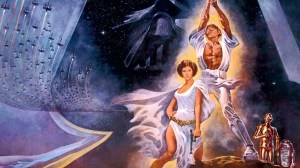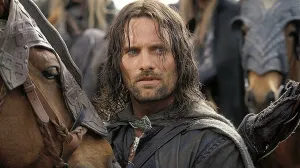Next week, ComiXology Originals will drop the fourth and penultimate issue of Edgeworld, a miniseries from veteran comics and animation writer Chuck Austen and artist Pat Olliffe. In his return to comics after years away, Austen opted to write a space western, in which “local people are disappearing and it’s up to Killian Jess, Magistrate of Rush, and his odd group of friends to find out what’s going on. But they’ve got freak sandstorms, a hostile military government and the aftermath of a planet-wide war to wade through in order to reach the answers they seek.” It’s a visually cool book and a surprising choice if you don’t know Austen’s mind.
Videos by ComicBook.com
Thankfully, Austen reached out to offer us a peek inside that mind, by way of an exhaustive rundown of the major influences that went into Edgeworld. It’s a melange of TV, movies, books, and three or four differerent genres — kind of like Edgeworld itself.
You can check out the series so far here.
Without further ado, let’s hand the microphone over to Austen to have his own say…

Edgeworld is the most unusual project I’ve ever created, or in this case co-created with my friend and partner Patrick Olliffe, and the first thing a lot of people wonder is; “where the hell did that idea come from?”
If you know my and Pat’s interests, the origins of this offbeat idea make perfect sense. It’s like you took our childhoods, threw them in a blender, and poured them over years of professional experience, and endlessly studying visual storytelling.
First, and foremost, we’re both western fans, me possibly more than Pat. John Wayne, Jimmy Stewart, Henry Fonda, all rode their various horses around in my imagination throughout my childhood. Much of that was my grandmother’s influence, as she loved everything western. She had more images of John Wayne hanging around her house than images of family members. More than just images, actually, she had a full-figure, four foot tall lamp of The Duke, and even a whisky decanter in his image. I’ve seen every John Wayne, and John Ford movie too many times to count. Most of them on TV, with my grandmother beside me.
And then there were the TV shows.
Gunsmoke

Gunsmoke was her favorite television show, and though it took me a long time to really appreciate it, I used to watch it with her all the time.
Memories of this bonding period during my childhood led me to revisit the series as an adult, and I learned to love it for the reasons she must have; its sophistication, its wit, and in the early seasons, especially, its intensity. Brilliant writers whose names no one now knows — but should — were etched into my brain.
Kathleen Hite, Marian Clark (yes, two regular women writers in the fifites, and early sixties), Les Crutchfield, the legendary Sam Peckinpah, and in particular John Meston, one of the shows creators, all delivered true emotions, hearfelt connection, frightening drama, and just damn good stories.
Gunsmoke is most known for the Sheriff/deputy sidekick/doctor trope that was used to death in westerns, and even science fiction series, and for creating phrases like “Get out of Dodge”, but the show was so much more, and often rarely about those three leads.
Gunsmoke: The Radio Show
Before it was turned into a TV series in 1955, Gunsmoke was a radio series with an entirely different cast; something my grandmother had occasionally mentioned, but it had never really clicked with me (who cares about radio programs, amiright?) until those old shows became available to listen to on iPods. All the same writers from the TV series started that show, and with the freedom of radio they delivered even more intense, and suggestive stories than television would allow. Gritty, toothy, and dark, the radio show brings a much dirtier version of Dodge City to life, and in many ways, a much more interesting one. Hearing those old shows led me to want to create something as intense, and thoughtful, and very story based.
True Grit: The John Wayne/Kim Darby version

I loved this story so much, it made the list twice, and I considered listing it a third time by including the novel. But this first movie is what brought it to life for me. Funny, scary, moving, with an astounding cast (except for Glen Campbell), it was hard to do it differently, make it unique, and still get it to work in the remake. The exchange between Robert Duvall and John Wayne as they face each other across that open field that ends with Duvall quipping, “I call that bold talk for a one-eyed fat man!” is a classic exchange, and has stayed with me since the first time I saw it. There are so many genius moments in this story, most of them directly from the Charles Portis book of the same name, so much charm and character; anyone could do worse than be inspired by it. Or by the novel.
True Grit: The Cohen Brothers Movie

Stylistically, this was Pat’s goal. He wanted our world to have this same weathered, worn out, gritty, dirty, sun-bleached, lived-in feel, coupled with the epic scope that wrapped around it. We both wanted the palette, and the weird characters that only Charles Portis, and the Cohen brothers could dream up. This version is closer to the original novel written by Portis, and responates on a deeper level than the original. At it’s core, one of the things that speaks to me in this story is the passing of the world from something chaotic and barbaric, into something new. An aging lawman formed in the truly wild west, a man who represents the old ways, ends up mentoring, and learning from, a young woman who is smarter, and tougher than he is. As a father of daughters, this strikes a real chord with both me, and Pat. On some level, you know your time is passing, and you’re handing off the torch to the next generation, imparting them with your experience and wisdom, so they will go off to hopefully make the world better than you were able to.
Once Upon a Time in the West

The dusters. It’s all about the dusters, baby.
Actually, there’s so much in this movie that inspires me; the use of time, the mounting tension, the hero with the dark, and painful secret past that drives him forward, the dualistic representation of evil in Henry Fonda, and some of the evil he’s passed on to his victims. The style, the feel, the direction.
And if we could have music in comics… it would also be about the music.
The Searchers

Again, the theme of the aging hero, who has mentored the next generation, and at the end of the movie finds he can’t go back home. There’s also the racism, the violence perpetrated on a people simply because they’re different, the hatred of a people not for what they’ve done, but who they are, and the perception that they are ‘lesser’. John Ford was a closet progressive, working with actors who were usually deeply conservative, and the contrast between performance and story makes for magical cinema. Ford also knew great visuals, and this is another of his epic scope films that make you feel you’re alone in a massive world of untold beauty and indescribable danger.
Dick Francis and the Thriller Writers
I love a good mystery. And I especially love a good mystery wrapped inside a thriller set in a world I don’t understand, and know nothing about, but will learn as the story progresses. Dick Francis was one of the best at this. He was the Queen’s jockey (yes, THE queen), and most of his books center around the world of professional horse racing, a world I knew nothing about before he guided me through it. As time went on, his wife would research other areas of interest where Francis wanted to set his stories; wine-making, toy manufacturing, mechanical limbs, etc., and he would guide me through those worlds. All while connecting me to wonderful characters, fascinating mysteries, scaring the bejeezus out of me, and making my heart race.
Island
I love Aldous Huxley. Brave New World is obviously his most famous work, but the novel that most nailed me in the forehead was Island. It’s the story of a broken man who finds unexpected solace on an island paradise, a paradise he can’t help but destroy. The True name of Edgeworld comes from this book as a tip of the hat to a master storyteller, and a brilliant thinker, and the concept of how we may find paradise, but we can never seem to keep it.
The Twilight Zone

One of the greatest shows ever created, it needs no introduction. So many of these individual episodes are seared into my developing childhood brain; “To Serve Man”, “Time Enough At Last”, “Nightmare at 20,000 Feet”, “It’s a Good Life”, and pretty much ever other.
The Twilight Zone solidified my love of the “one-and-done” story approach. ‘Come in, sit down, and let me tell you a tale.’ At the end you may smile, you may cry, your hair may be standing on end, but you will leave satisfied, wanting to see the next one because you enjoyed this one, and not because it left you with a cliffhanger that makes you think the story isn’t yet over.
Star Wars

Is there anything about Star Wars that hasn’t been said? Maybe just this:
I’ve loved this movie since I first saw it, but I came away with some very different thoughts after it was over. “Why is Mos Eisley a space port? To where? From where? Why is this little backwater desert world that Luke hates so impoortant? Important enough for the Empire to police?”
There were a lot of the other questions, many of them coming from the fact that I watched the movie that comes next on the list a week after seeing Star Wars for the second time.
The Best Years of Our Lives

This movie deserved its many Oscar nominations. The first real movie about coming home after the war and coping with its never ending aftermath. Disabilities, post-traumatic stress, nightmares, and difficult regaining intimacy.
It made me think more about the movie I’d just seen the previous week, Star Wars. That film was intended to be just light-hearted fun, entertaining space opea, and it succeeded for me. But when you’re a creative person, the “wheels of wondering” start to spin, and you can’t stop your mind from going down tracks it desperately needs to go.
“What happens after the Star Wars? Do those soldiers have post-traumatic stress? Did they know they were working for an evil empire? Was it just a job? Were they zealots? Did they care? Did they have wives? Husbands? Family they had to come home to? Did they fall in love with locals? The ‘French girls’, as it were? Or even Nazis? Did they want to bring those loves back to their world? Was there a cure in the future for Post Traumatic Stress?
What were the human consequences of all that futuristic, intense, cosmic violence?
Star Trek

Last, but never least, the most influential show ever, in my life, was Star Trek, the original series. Again with the “one-and-done” format. Again with the “Sheriff/doctor/sidekick” trope. Again with great characters and great writing. And most importantly for me, as a kid from ‘the wrong side of the tracks’ their world more accurately represented my own. Varied races, diverse personalities, strong women, military men (my dad was a Navy Chief).
And those “one-and-dones” were powerful, moving, and memorable. I watched this series so many times I could at one time tell you which episode we were watching before the first line was uttered. I still geek out about them, and as much as I recognize it was sexist with its mini-skirted ‘secretarial’ women, and still had the ‘dominant white male lead’, it led me to think differently, and to be able to adjust to a changing world. It was very different from what came before, and it was the first step in a more inclusive direction. First steps are never perfect, but they’re important, and they’re still a step forward, not back.
Edgeworld is about that next step, as Killian passes the mantle to Cheela, and the next generation. Far from perfect, himself, but recognizing that his time is passing, and that he can help usher in the new world that needs to come next.
And aliens. It’s also about weird aliens.
About the creative team
About the Writer: Chuck Austen has worked on so many different things he feels the desperate need to lie down. His animation skills have been part of King of the Hill, Steven Universe, The Cleveland Show, and he co-created the hit series Tripping the Rift for SYFY. He has spent the last five years as a producer for DreamWorksTV on Dawn of the Croods, Rocky and Bullwinkle, and She-Ra and the Princesses of Power. He also wrote a lot of comics, including Uncanny X-Men, JLA, Superman, and The Avengers. His favorite personal work, by far has been with comiXology, Patrick Olliffe and the talented team on Edgeworld.
About the Artist: Patrick Olliffe is a veteran comic book illustrator with over 32 years of experience, working for some of the largest publishers in the industry, including Marvel Comics, DC Comics, Dark Horse and Disney Publishing. His long list of credits include drawing such characters as Spider-Man, Thor, Batman, Superman, Wonder Woman, Captain Marvel, Catwoman, Hawkman, plus for Disney’s Marvel Press, Captain America, The Fantastic Four, Hulk, The Avengers, and The X-Men. He is thrilled to be partnering with Chuck Austen and the rest of the team to bring Edgeworld to life!








